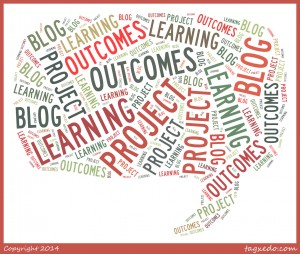In a previous blog post I discussed my disconnection from the idea that learning outcomes (LOs) are ‘student-centred’ because, predominantly in current practice, students play no role in actually developing them. I argued instead that LOs should be collaboratively devised by lecturers and their students to ensure that the outcomes become ‘the property’ of the learner. Some of my key comments were:
I feel disconnected from the idea that learning outcomes are ‘student-centred’ and are focused on what the student is doing because these outcomes are, in practice, largely handed down to the student from their tutor. To me this means that though learning outcomes are expressed from the student perspective, they are still primarily teacher-driven. However, all would be different if students themselves were actually involved in the process of creating their learning outcomes.
…
If we could make learning outcomes ‘the property’ of the learner and not something just handed down to them, wouldn’t that make them more student-centred and mean that students might be more engaged to achieve them?
…
I can’t think of any reason why learning outcomes can’t be collaboratively developed by lecturers and their students as the module progresses to take account of what both want to achieve from the process. Broader outcomes could still be pre-specified at the beginning of courses to give students an overall view of what they will be working towards. But more specific and collaboratively defined ones, that fit within the framework of the broader ones, could develop through lecturer and student dialogue and discussion. In this way, students would feel part of a process that is supposed to be ‘student-centred’.
I’m very pleased to say that the ‘Learning Outcomes Project’ is now putting my words into practice by conducting a study to explore how students can be effectively engaged in the process of developing their LOs. Without doubt, this is going to be a study that offers particular challenges. For example, as I stated in my previous blog post on this topic, at the beginning of a module it is the tutor who has all the relevant information about the module, i.e. content to cover, focus of assessments, etc. Students don’t have all this background knowledge about the module and ‘don’t know what they don’t know and most likely don’t know what they need to know’.
Consequently, the aim of our study is to explore frameworks regarding how student involvement in developing LOs could occur and what type(s) of LOs support collaborative development (e.g. content-based ones, broader ones, those that are more specific or tightly focused, etc).
The value of our study has recently been confirmed by its inclusion within the Higher Education Academy’s (HEA) Strategic Enhancement Programme, as part of the ‘Engaged Student Learning’ strand. Our place within this programme means that we benefit from developing networks with colleagues in other institutions who are also concerned to enhance student engagement within areas of their own practices. At our first network meeting, the HEA shared the following resources, which may be useful to others interested in this particular area:
- Engagement through partnership: students as partners in learning and teaching in higher education
- Framework for partnership in learning and teaching in higher education
We are just at the start of our study and I look forward to giving further updates about our activities and the progress we are making. I am excited to be focused now on exploring how we can make LOs truly student-centred.





 Subscribe to Kerry Dobbins's posts
Subscribe to Kerry Dobbins's posts
[…] a previous blog post I detailed a current project that we are working on which concerns engaging students in the process […]
[…] a previous post I described a specific study that we are currently undertaking in the ‘Learning Outcomes […]